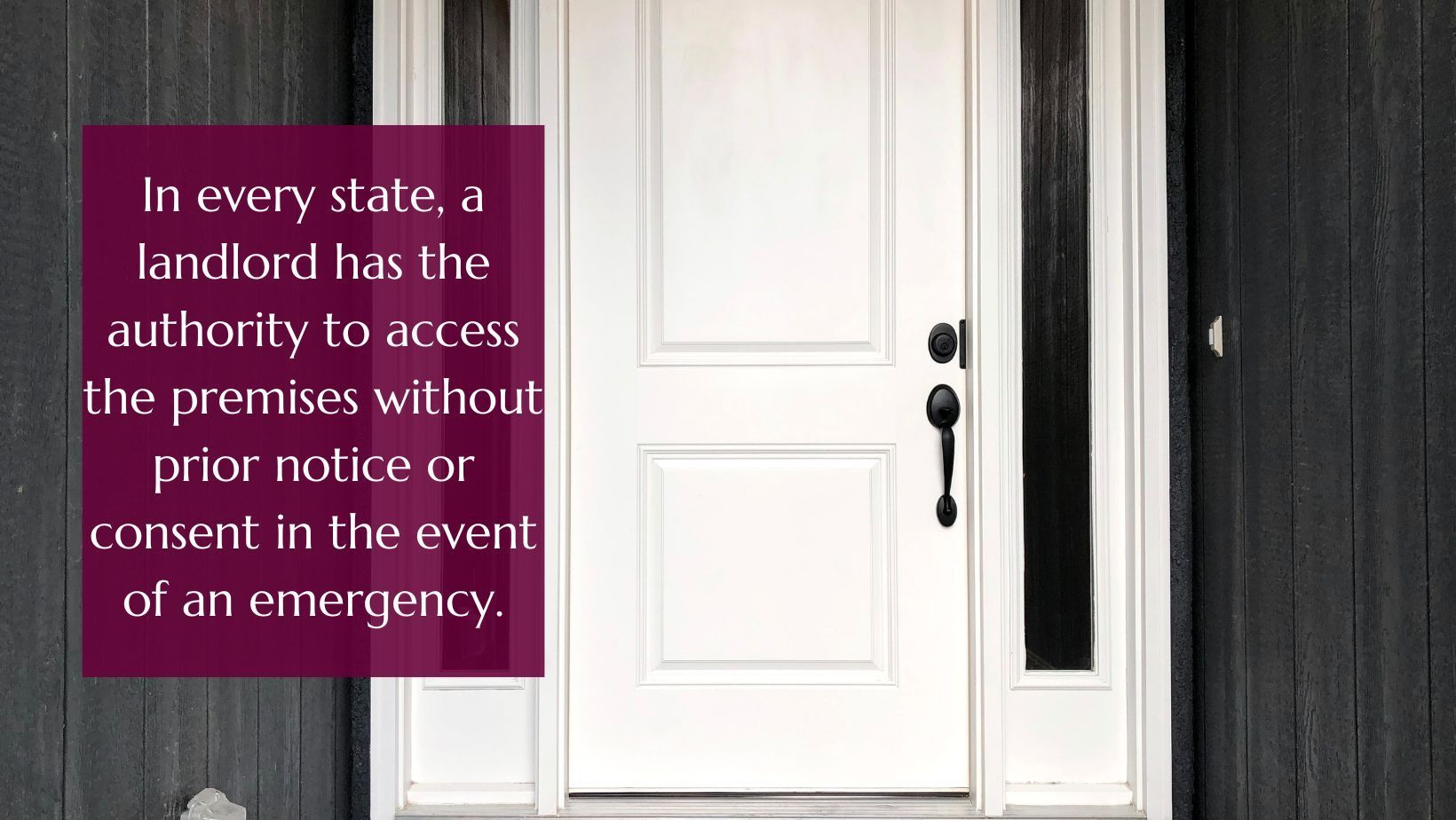Can Renters Refuse a Landlord Access? When it’s Legal to Enter Your Rental

Can Renters Refuse a Landlord Access? When it’s Legal to Enter Your Rental
In the world of rental agreements and property ownership, it's imperative for both landlords and renters to have a clear understanding of their respective roles, rights, and responsibilities. Nowhere is this more apparent than when it comes to accessing or entering a unit. Landlords need to keep a balance between respecting the privacy and preferences of their tenants while ensuring the upkeep of their valuable investments.
Most Missouri and Illinois property owners have similar restrictions regarding requests to enter rental units. Smart landlords develop policies based on what has worked for others, then include them in leases.
Honoring Tenants’ Rights
A landlord’s responsibility to the tenant when it comes to entering the property includes: giving notice, scheduling a convenient time, and letting the tenant know when they need access to the property.
The protection of tenants’ right to privacy is a foundational principle of
landlord-tenant relationships. Many states honor this principle with laws on when building owners can access rental properties.
Illinois requires landlords to notify tenants at least 24 hours in advance when they need to enter a rental for repairs or other reasons. (Property managers may enter immediately if there is an emergency such as flooding or a fire.) Some Illinois cities require more notice. In Chicago, building owners must notify tenants 48 hours before entering their unit.
The
Missouri Landlord-Tenant Law, on the other hand, does not include regulations on building owner access. But most St. Louis area property managers have adopted the practice of notifying tenants at least 24 hours before entering a unit. In addition to giving 24-hours advance notice, landlords honor tenants’ rights by planning to enter the unit at a previously agreed upon time. This may be during business hours on weekdays and a short period of daytime hours on the weekend. The building owner access also may be in the evening if that works best for both the landlord and the tenant. Typically there is good rapport between tenant and landlord and it’s easy to set up a schedule that works for everyone.
Since there is no law to support a Missouri property owner’s need to enter a rental unit, entry policies need to be included in the lease. Without the specifics, it may be within tenants’ rights to refuse access to a landlord.
Missouri tenants may sue their landlord for breach of contract if they enter their unit without permission, especially if the landlord has no good reason to enter or they barge in unannounced. The tenants may seek to recover money lost in the conflict with their landlord. Plus, a judge may issue an injunction to keep the landlord from entering rental units. Landlords also are at risk of being charged with criminal harassment in disputes over building owner access.

Communicate the Reasons for Building Owner Access
Landlords will save themselves a lot of frustration simply by communicating with tenants about the need for access. When giving a tenant notice of the intent to enter their unit, the landlord should state the reason why access is necessary. Typical reasons include:
- Repairs,
- Scheduled maintenance (for example spraying for pests),
- Inspection of the property,
- Confirming that a tenant has abandoned the rental,
- Showing the property to prospective renters,
- Tenant safety or health code violations,
- To issue an eviction notice, and
- To comply with a court order.
Some property owners think they can enter without permission in certain cases—for example, if the landlord suspects that a tenant is housing a pet and that isn’t allowed by lease. Or maybe they suspect that something illegal is taking place, and the landlord wants to put a stop to it. These reasons for a landlord entering the property may be well intentioned,
but if the circumstances are based on assumption then it is unlawful.
In Missouri, where there is no law about landlords entering rental units, it is still important to include the reasons a building owner may access a rental unit in the lease. Without this information in the lease—a legal contract—landlords are poorly positioned to defend their desire to enter the rental unit when tenants refuse them access.
Take Action When Tenants Refuse Landlord Access
In some cases, St. Louis area tenants have the right to refuse the landlord access to their home. In Missouri, tenants can keep landlords out if there is nothing in their lease saying they must give them access.
Illinois renters can
refuse their landlord access if they think the request to enter their home is unreasonable. One common complaint is the landlord wants to enter at a time that is inconvenient. Finding a time that works for both parties is advisable.
Some tenants refuse their landlords access because they do not want non-essential repairs to be made while they live there. For instance, they do not want the inconvenience of living in a rental home that is getting new flooring. In Illinois, tenants are allowed to refuse landlord access in such a case, but a tenant cannot go as far as changing the locks to keep the landlord out.
Landlords who cannot reach an agreement with their tenants can take the following legal actions:
Inform the tenant the property owner has a legal right to enter their unit.- Tell the tenant refusing landlord access is a violation of their lease.
- Issue a seven-day notice to cure and post it on their door. A notice to cure is a letter warning them of their violation and what they must do to avoid eviction.
- File a lawsuit against the tenant.
As a last resort landlords can evict the tenant if all other options have been exhausted.
When Landlords Can Enter
In every state, a landlord has the authority to access the premises without prior notice or consent in the event of an emergency. For instance, if there's a sudden pipe burst in your apartment that's causing water to leak into the unit below, your landlord or a member of the maintenance team may enter your residence in your absence.
Even when your landlord provides advance notice, they must have a valid reason for entering the property. Typically, your landlord can lawfully enter without a tenant present under the following circumstances:
- In emergency situations.
- To carry out necessary repairs.
- When exhibiting the property to potential tenants during the lease termination process.
- For safety inspections or to ensure compliance with building safety codes.
Get Help from Professional Property Managers
Landlords do not need to go it alone when they face tenants who refuse them access to their rental units. Select Leasing and Property Management in St. Louis partners with landlords and property owners to develop the best response to challenging situations such as tenants refusing access to building owners.
We also work proactively by managing property owners’ communication with tenants. In addition to sending notices about when rent is due, we contact tenants about building access when repairs are scheduled. Many property owners think the cost of
hiring a property management company is well worth it.
Cover Photo by peterschreiber.media by Canva.com
Share this post










